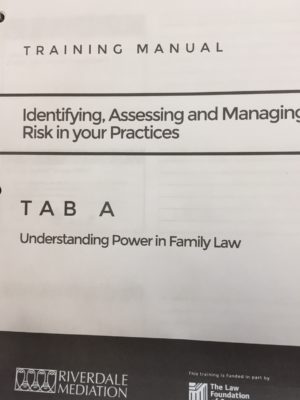
Over the past year we have had the privilege of working with a group of family dispute resolution professionals in PEI who are pioneering parenting coordination there.
Parenting coordination (PC) is an innovative mediation, coaching, educative and decision-making process that offers high-conflict parents a way to resolve disagreements about their children without going before a judge. It is usually a long-term commitment by the parents— one to two years— and is provided in a number of different ways— publicly, privately, open with reports back to the court and confidentially between the parents only— depending on the jurisdiction.
Spearheaded by progressive thinking among government, judiciary, family lawyers and mental health professionals, this innovative PEI program was designed to equip a full time parenting coordinator to assist families in court and empower the local FDR community to offer private parenting coordination services.
 Supported by The Premier’s Action Committee on Family Violence Prevention and the PEI Department of Justice and Public Safety, a full time parenting coordinator will be embedded in the Family Court Counsellor’s Office this spring. This office, which already offers free parenting assessments for cases in court and free family mediation, offers another vision of how access to justice can be delivered effectively in a court-based community hub.
Supported by The Premier’s Action Committee on Family Violence Prevention and the PEI Department of Justice and Public Safety, a full time parenting coordinator will be embedded in the Family Court Counsellor’s Office this spring. This office, which already offers free parenting assessments for cases in court and free family mediation, offers another vision of how access to justice can be delivered effectively in a court-based community hub.
Our training, which was partly funded by the Law Foundation of Ontario, consisted of two sessions; one focused on family arbitration law and practice and another on identifying, assessing and managing power imbalances including family violence. We worked closely with Dr. Barbara Fidler, who is leading the parenting coordination aspect of the training, and Wendy Verhoek-Oftedahl, a family violence coordinator working for the government.
Parenting coordination is a process that is evolving in different ways in Canada. PEI and British Columbia have taken the step of supporting the process with legislation, training standards and professional support. In Ontario, the Family Dispute Resolution Institute of Ontario has created a certification (Certified Specialist in Parenting Coordination) that requires the highest standard of training of all that organization’s FDRP designations. This makes sense; parenting coordination is a highly challenging process.
 It requires great mediation skills, empowering and empathetic communication abilities, clinical and legal knowledge, resourcefulness and credibility in the community, and the ability to conduct a fair and impartial arbitration process when all other efforts to resolve the parents’ dispute have failed.
It requires great mediation skills, empowering and empathetic communication abilities, clinical and legal knowledge, resourcefulness and credibility in the community, and the ability to conduct a fair and impartial arbitration process when all other efforts to resolve the parents’ dispute have failed.
Our training highlighted the unique complexities of this process, including the need for specialized knowledge and tools to correctly differentiate high conflict cases from those where a parent or child could be at risk of harm, and skills for providing due process in the kind of abbreviated and informal arbitration hearings typically conducted in PC files. We focused our workshops on case law, largely from Ontario, where family mediation-arbitration processes have failed due to inadequate “screening” for suitability by the arbitrators, and where decisions of parenting coordinators have been overturned due to insufficient attention to the requirements of natural justice.
 Because PC work focuses exclusively on the best interests of vulnerable children, the professionals drawn to this work typically have a high degree of concern for the outcome, which is appropriate. Our training aimed to teach the fundamental elements of due process and screening for suitability and risk assessment, and the attitudes and skills required to carry out these functions well.
Because PC work focuses exclusively on the best interests of vulnerable children, the professionals drawn to this work typically have a high degree of concern for the outcome, which is appropriate. Our training aimed to teach the fundamental elements of due process and screening for suitability and risk assessment, and the attitudes and skills required to carry out these functions well.
The evaluations from our latest workshop were encouraging. The majority of participants found the materials, role plays and quality of feedback exceeded their expectations and were “extremely” satisfied with the training. The pre and post-training surveys indicated that the participants valued their increased understanding of power imbalances and family violence; they felt more able to differentiate among types of domestic violence and to identify the indicators of potential lethality; and felt more confident in their ability to safety terminate mediation and arbitration in cases of high risk.
For more on this training and the innovative PEI program, see the Q&A with government officials in the FDRIO February Parenting Coordination newsletter.

